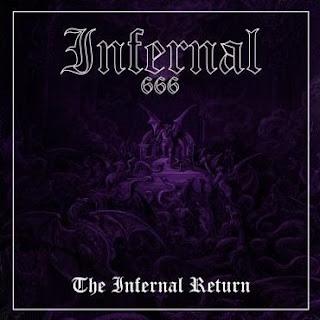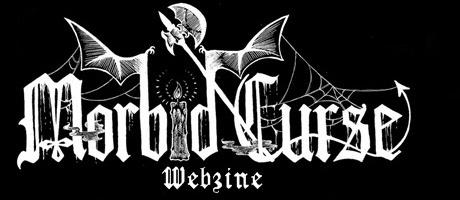
|

|
Infernal (1999)

After leaving Dark Funeral, sometime in 1996, Blackmoon directed his efforts toward
recording the second Necrophobic album, Darkside. Following this, he was involved with the War project. He also put
together yet another band, recruiting former Dark Funeral vocalist, Themgoroth, and Impious (of In Aternum). In late 1998,
these three were joined by Matte Modin as they entered Dugout Studio to record their self-titled E.P. The recording would
then be completed at Abyss Studio, which was also the spawning ground of The Secrets of the Black Arts. The cover
art was taken from "Inferno" (The Divine Comedy) by Gustave Dore and the band makes specific mention, in the liner notes,
that no keyboards were used on this recording. That says a lot for the musical climate, at that time, as far too many bands
were emerging from all sides, hiding awful musicianship beneath a wall of synth. None of that is found here. What the listener
is exposed to, here, is what the Infernal call 'Satanic holocaust metal'. This is a very appropriate description.
"Requiem (The Coming of the Age of Satan)" erupts like a violent storm of dark
and malevolent forces, seeking to utterly destroy the frail human spirit as Blackmoon's nocturnal melodies are accompanied
by Themgoroth's absolutely demonic screams. The drumming is incredibly intense, yet very skilled. The guitar solo proves to
be another welcome addition to the music. This song is merciless in its approach, completely crushing everything in its path.
The sound is very similar to The Secrets of the Black Arts, yet even more violent and destructive. Despite its chaotic
fury, the riffs are actually very memorable. It is very obvious that this song was composed by no amateur.
"Wrath of the Infernal One" begins with more of Blackmoon's trademark riffs, creating
a cold and nocturnal aura. The lyrics are as blasphemous and evil as anything found on the early Dark Funeral material. About
halfway through, there is yet another lead solo, just to add to the dark atmosphere. This song has a barbaric pace, much like
the opener, yet the exceptional songwriting abilities possessed by Blackmoon are revealed here, as this is similar and yet
quite different from that song.
The next song is "Storms of Armageddon", bursting forth from the deepest abyss
to take your feeble human spirit into the darkness, only to be ripped to shreds and condemned to hellish torment. Mid-way
through, there is another brief solo that sounds reminiscent of something from an early Necrophobic album. The tremolo riffs
that slither through the chaos seem to take hold in the darkest recesses of your mind, haunting you long after the song has
concluded.
"Under the Hellsign" is the final song, beginning with demonic screams from beyond.
This continues the frantic pace that has been established by this point. This E.P. would make a good soundtrack for a battle.
The cold tremolo riffs stand out amidst the hellish storm of blasting drums and Themgoroth's possessed vocals, sounding a
bit like old Mayhem. There is not much variation, from song to song, as the same fast pace dominates this recording, yet it
is impressive to see a band managing to accomplish the most within these limits, making sure that each song has an identity
of its own.
If you were disappointed with the direction taken by Dark Funeral, following the
departure of Blackmoon and Themgoroth, then you are encouraged to seek this out. While Ahriman and his pals went on to release
watered-down trash so they could justify all of their gooofy band merchandise, Blackmoon proved that he was the dark soul
of that band and carried on with what he started. In fact, without the pathetic interference of his former bandmate,
Blackmoon was able to create something even darker and more violent, on his own.
(11 Feb. 2009)

This recording was absolutely cursed.
Eight miserable years passed since the
last release from Sweden's Infernal. Line-up problems caused the band to go on an indefinite hiatus, following the release
of Summon Forth the Beast. David Parland (aka Blackmoon) retreated to the shadows
while others continued on with bands that he had created, coasting along on a reputation that they did not earn. After some
years, in late 2008, he reemerged and was determined to make a poignant musical statement. Unfortunately, things were
doomed from the start.
His first mistake was to enlist the service of Tomas Asklund, someone who had betrayed him in the past. Of course,
such things tend to be overlooked since skilled drummers are difficult to come by (especially one with his own studio).
Infernal was set to record a four-song demo, to be released in the summer of 2009. However, Asklund's involvement with
Gorgoroth created delays. When David posted about this on the band's Myspace page, to let fans know that the previous timetable
was no longer accurate, his bandmate was angered for some reason. This seemed to be a common thing, so it came as little surprise
when Asklund blew a gasket over some comments Parland made in an interview for this very site. Apparently,
speaking honestly and openly is frowned upon by many in the Swedish scene and there were actually several others who
made their feeble opinions known.
Time and again, David attempted to make peace and proceed with the project, but it all fell apart.
Then a ripoff label called Goathorned Productions contacted him with an offer to release the material as an E.P.
It was decided to at least finish up the two songs that were already recorded, but Asklund refused to hand over the master
tapes. Now that they were no longer bandmates, he insisted that David pay for the studio time in order to get the files. This
was despite the fact that Parland helped fund the studio years earlier, in the first place. Eager to just get this
situation behind him and to have something for the 7", he agreed to the demands for payment and was then denied. The idiot
drummer was being as unreasonable as possible and making problems, as always. All of this stress only exacerbated the depression
and physical pain that David lived with on a daily basis, and began to kill off his drive to create anything. Still, music
was the most important thing in his life and he fought on and pushed himself.
So it was decided
that Parland would recruit new members and re-record the songs, as well as a couple others, all at his own cost.
After a lengthy search, he finally settled on a drummer from Norway, as well as former Necrophobic member, Martin Halfdan
(who had actually already agreed to participate before the problems began). Sadly, while the new drummer was much nicer, he
was not quite as talented as hoped and could not pull off the material in a precise manner. So much precious time had been
wasted. Even without the actual master files for each separate instrument, David decided to go ahead and just use what he
had to finish up the two songs for the E.P. Finally, in May 2010, The Infernal Return was released.
A rather brief recording, there are only three tracks here, one of which is an intro. The two actual songs are quite
different from one another, though one can clearly hear the same sense of melody in each. Parland's trademark guitar style
is easily recognized. Unlike the previous Infernal releases, the sound here is not dominated by chaotic hellblasting. During
this time, David spoke of his fondness for the old Necrophobic days and was looking to incorporate more melody and less brutality
into his music. Even the faster of the two songs, "Of the Seven Gates", maintains rather simplistic drumming that allows for
the cold, nocturnal riffs to breathe. As such, they are better able to weave their way into the listener's mind
and to create a haunting atmosphere. The lead guitar solos are a definite nod to his musical past, as well.
Another thing worth mentioning is that, for the first time, he is handling vocal duties as well. Despite not being
overly confident in his ability to do so, he sounds fine and provides a decent break from the likes of Themgoroth. The vocals
are deeper and more powerful, sort of rough, and sound filled with anger. This is particularly noticeable in the last
track, "Godforsaken (With Hate I Burn). This mid-paced song may not be quite as strong as the other, but is still solid enough.
As with "Of the Seven Gates", the lyrics convey a sense of dread and share the theme of leaving behind this rotten world.
The Infernal Return was meant to be a four-song demo and ended up as a two-song E.P. (not
counting the intro, of course). Though short, this release gives a decent overview of David Parland's musical past and may
give an idea as to what awaits. It is a shame that so many things went wrong, since all that came of these sessions was less
than ten minutes of music. With any luck, this will only be a small taste of what is to come. Also, on the plus side, any
future recordings will be free from the horribly mechanical performance of Tomas Asklund, as well as the plastic and sterile
sound of his production. Even if it often seems as if he is armed with only toothpicks while facing a whole army, David is
a warrior at heart and continues to fight against the world. Music has been the single most important thing in his existence
and he is incredibly driven. Despite the seeming nuclear fallout, he still drags himself forward in an effort to achieve his
goals. Hopefully, this E.P. is just the beginning. It is limited to 500 copies, so anyone who wishes to obtain this should
do so quickly.
(2 May 2010)
Return to index
|

|

|


